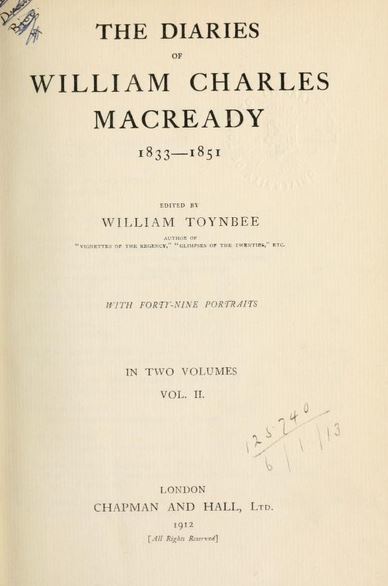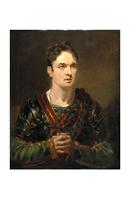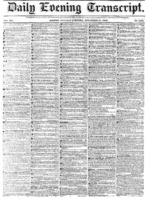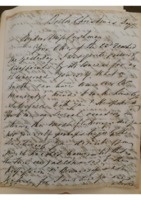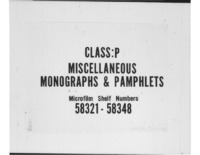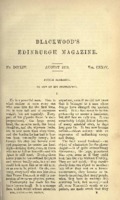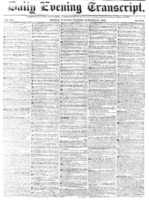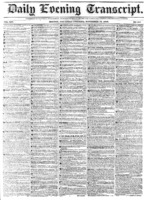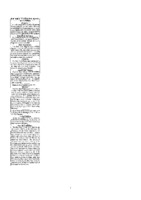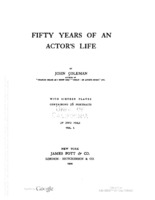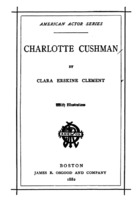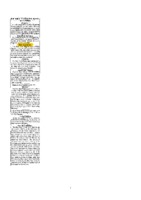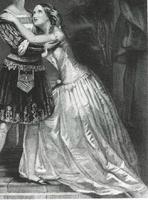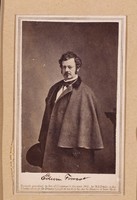Dublin Core
Title
Subject
Description
In December 1843, his diary entries also show that Charlotte counting on him as a potential actor for her Benefit without asking him has infuriated Macready. Other people address him on this subject matter which only sparks further resentment.
In 1844, the dynamic changes as Charlotte dictates the conditions of engagements and Macready depends upon her approval before being accepted as actor. In August of that year, Cushman even refuses to act for Maddox if Macready gets a role.
The entires further reveal that Macready's colleagues spread gossip about Cushman; the entries also include sarcasm and sexism.
Waters's biography of Cushman quotes from this diary.
Creator
Source
Macready, William Charles. The Diaries of William Charles Macready: 1833-1851. Vol. II. Edited by William Toynbee, Chapman and Hall, 1912.
Type
Diary (Entry) Item Type Metadata
Text
Oct 22, 1843: "The Miss Cushman who acted Lady Macbeth interested me much. She has to learn her art, but she showed mind and sympathy with me; a novelty so refreshing to me on stage." (Macready 230)
Nov 11, 1843: "Went to rehearsal of Macbeth. Mr. Hamilton, stage-manager, spoke to me of Mr. Pelby's annoyance at my desire that Miss Cushman should act with me, and that he had only just before answered an application of hers to the same effect, declining her assistance; this I thought had taken place at the beginning of the season, and certainly it gave colour to his reasons for resentment. A few words, however, soon put all things straight, and everything proceeded on a perfect understanding." (Macready 234)
Nov 12, 1843: "Note from Miss Cushman, announcing her arrival and wishing to see me. I am in a strange country, and I think it is only a duty to myself to be strictly circumspect. I have not the slightest purpose, dream, or intent of wrong or folly, and therefore I keep it at arm's length. Wrote to her, promising to see her to-morrow, which I will do in the common room." (Macready 234–35)
Nov 13, 1843: "Looked over Macbeth, being most anxious about my performance. Went to the theatre and rehearsed it; had sad misgivings as to the effect of Lady Macbeth, who does not understand the words she has to speak, and speaks words that no one can understand. After rehearsal saw Miss Cushman, and talked with her a short time. I discharged myself of my obligation to her, paying her $50 in notes." (Macready 235)
Nov 14, 1843: "Received a note from Miss Cushman in great delight at the performance last night; she described tha audience as particpating in the enjoyment she experienced. I hope it was so. Mr. Pelby would not allow Miss Cushman to act – eh bien! Rehearsed Hamlet. These are an awful set of Daggerwoods! Called on Miss Cushman in the common room, declined visiting her in her own." (Macready 235)
Nov 17, 1843: "Note and flowers from Miss Cushman. Read her poem on Babington's conspiracy – very powerful and clever." (Macready 236)
Nov 18, 1843: "Called on Miss Cushman and chatted with her some time. She told me of a conversation she had heard between two watchmakers – one of whom had seen Mr. Forrest and myself, the other had not seen me – to convey his idea of the two men, the one observed, 'Why, you see Forrest is a watch upon a common lever, and Macready's a chronometer.'" (Macready 237)
Nov 23, 1843: "I called on Miss Cushman, talked with her a little, and took leave of her most kindly, but without the slightest indication that our acquaintance is to become more intimate. She kissed my hand, but I was only kind. I sent afterwards the verses she had lent me." (Macready 239–40)
Nov 28, 1843: "Received two papers with well-written articles; in one it was copied from a New York paper that Miss Cushman was to accompany me in my Southern tour and then go to London and appear under my auspices. This is really too bad – without a shadow of truth." (Macready 240–41)
New York, Dec 4, 1843: "Rehearsed Melantius – the play in a wretched state; Miss Cushman, who had her part when I was in Philadelphia, reading! – knowing nothing of what she had to do! How can there be artists when this lady, one of the most ambitious, so entirely disregards the duties of her calling? Amintor – reading!! – without a remote guess at the meaning of his part! The drama is declining do people say! – what drama?" (Macready 241)
Dec 5, 1843: "Talked with Miss Cushman about her want of energy and purpose in studying her art. She made the usual excuses. She told me that Mrs. Butler was literally wretched, that Butler's feeling to her was absolute aversion; I do not know her authority for saying so much – that Mrs. Butler had written to her that the only consoling reflection on her birthday was, that another year of wretchedness being gone, she was so much nearer its termination. Miss Cushman said that but for her children, she would go on the stage again. That would not do." (Macready 241)
Dec 6, 1843: "Acted Melantius – unequally, some parts good, in others felt a want of strength, in others was cut up by the people (particularly by the person acting Archas, the jailer; this man was conspicuously absurd and deficient) with me – Miss Cushman particularly." (Macready 241)
Dec 8, 1843: "Went to the rehearsal of Benedict; was much dissatisfied with several. Saw enough of the unsteadiness of Miss Cushman to perceive that the first qualification of an artist is not there. She was speaking to me of Mrs. Butler, with whom she naturally sides in the question of disagreement with her husband; she ascribes the unhappiness to arise from his fickleness and infidelity; but I have seen enough to satisfy me that there has been enough at home to drive a loving heart from home. I admire her and like much in her, but she is unhappy in not being aware of the profit and the delight of conciliating." (Macready 242)
Dec 9, 1843: "Looked at some American Saturday papers, which state that Miss Cushman more than shared the applause of the audience with me in the Bridal. If it was so, I never heard one hand of it. She is an intriguante, I fear, a very double person." (Macready 242)
Dec 11, 1843: "The treasurer came to tell me that the people would not take places for Much Ado – he affected to throw it on Miss Cushman, but I suppose they do not understand it or do not like it. I am agreeable, and changed to-morrow's play to Werner. Went home to devise some substitute for King Lear. Ryder came in and suggested Marino Faliero. I considered it, and found it the best thing to be done. Acted Melantius fairly; called for. They called for Miss Cushman here, who gets puffed in the papers – very absurdly." (Macready 242)
Dec 13, 1843: "Ryder came in. I asked him to get a newspaper for me. He inquired if Miss Cushman had asked me to play for her Benefit on Saturday, which he had previously in the morning told me was her intention. I told him no. He said he had communicated to her how displeased and angry I should be at any application of the sort, but she said she should write to me and ask me. I was very angry. He had also told me that Mr. Hunt wished me to act for his wife's Benefit. My anger cooling (who ever does right in anger?), I thought of a mode of dealing with Miss Cushman. At the theatre sent for Mr. Hunt, asked him about his request, which he admitted, and I in the kindest manner explained to him that it was not possible, etc. but that if I did I would for him. I thus have fixed Miss Cushman. Acted Cardinal Richelieu and was cut up root and successive annoyances. Was called for – and so was Miss Cushman!!! Much flattered! Pah! Wrote a letter to dear Forster." (Macready 243)
Dec 23, 1843: "At my hotel I found a letter from Miss Cushman, detailing all – and much more than was true – that I had not let drop before Mr. Ryder on the subject of her Benefit at New York. It is too bad that I am to be tormented thus. I answered her letter." (Macready 243)
Dec 26, 1843: "Letter from Miss Cushman – oh! I do not like thee, Dr. Fell!" (Macready 244)
New York, May 8, 1844: "Wrote to Miss C. Cushman, as I had promised Simpson, wishing her to play here during my engagement." (Macready 271)
Sept 14, 1844: "Miss Cushman said he would play a trick – he would have a fit; it seems he was drunk last night. Well, it was settled." (Macready 274)
Paris, Nov 9, 1844: "Mitchell and Serle called, and after showing him the danger of announcing the English performance at Paris before Miss Cushman's and Mr. Ryder's arrival, I consented to open, if they arrived in time, on the 2nd of December." (Macready 276)
London, July 30, 1845: "I told Forster what I should ask – £100 per week for three nights per week for eight weeks. I required, as a condition, no one; but if he has asked me to suggest, I should name Miss Cushman as the person to act those parts I most required help in – Queen, Lady Macbeth, etc. These terms were the same Maddox had offered, and been willing to give me, and £20 per week less than Mitchell had offered. I told Forster that it was not my desire to over-weight the theatre. After reaching home wrote a note for Forster, not wishing my name to be given officially to Mr. Webster as recommending Miss Cushman, which might seem unkind to Helen Faucit, and extending my proposition from eight weeks to sixteen weeks." (Macready 299–300)
To Eastbourne, August1, 1845: "Mr. Webster offers to give e my pecuniary demand for eight weeks if I will get the services of Miss Cushman. Forster declined the proposal without seeing me." (Macready 300)
St. Helier, August 13, 1845: "a letter from Forster with reports of his negotiation. Two curious pieces of information he gives me; one, that Miss Cushman will not engage at all with Mr. Maddox, if it is to act with me. This is perfectly intelligible in the contemplation of the woman's perfect inconsistency;" (Macready 301)
Sept 1, 1845: "Mr. Maddox called; after much random conversation, he promised to endeavour to see Miss Cushman and get her to see me." (Macready 302)
Sept 28, 1845: "Mr. Maddox called, again to speak to me about Miss Cushman; this woman is full of the idea of her own importance, and will not listen to any other notion. We must try to work through the engagement – without her would be easy enough, but without any actress!" (Macready 305)
Nov 6, 1846: "Note from Miss Susan Cushman, wanting to separate from her sister, and ally herself professionally with me! Appointed her, according to her wish, to call to-morrow – not to entertain her offer." (Macready 348)
Nov 7, 1846: "Miss Susan Cushman called, and I had a long conversation with her, endeavouring to persuade her of the mutual folly of herself and sister separating, but urging her to conciliate and succumb rather than part." (Macready 348)
Oct 4, 1847: "Acted Macbeth as well as I could after so long a respite. Called for; led on Miss Cushman, who thanked me for the civility." (Macready 373)
Oct 6, 1847: "Called, and led on Miss Cushman." (Macready 373)
Oct 11, 1847: "Acted Macbeth (at Princess's Theatre) with great power. Called and let on Miss Cushman. An anonymous letter telling me the Sunday Times and Dispatch said I was decreasing in vigour – my kind, constant, and true friends!" (Macready 373)
Oct 25, 1847: "Acted Hamlet, I think, very fairly. Called and very warmly received. Mr. Maddox showed me a note in which Miss Cushman offered to him, if I had no objection, to act the part of Adriana in Philip Van Artevelde." (Macready 375)
Oct 29, 1847: "Acted Othello, I think, very well. Called. Led on Miss Cushman who, according to Mr. Maddox, said, in the presence of Mr. Forster, "He and his whole theatre might go to hell," etc. He persisted that she repeated this! Our art!" (Macready 375)
Oct 30, 1847: "A Mr. G. Bell called to speak to me about Mr. Maddox taking Miss Susan Cushman out of Ophelia – of which I knew nothing. He seemed desirous of working on my apprehensions that it would be supposed it was at my instigation. I told him that utterly ignorant I was about the whole matter, it was of no consequence to me what either individuals or a multitude thought of me." (Macready 376)
Nov 20, 1847: "Rehearsed Philipp Van Artevelde, but was afraid to excert myself on account of my throat. […] Adriana is very bad, unmeaning, and dull. There is no disguising this" (Macready 377)
Nov 29, 1847: "Knowles and Maddox came into my room. Maddox told me an extraordinary story about Miss Cushman!" (Macready 378)
Dec 1, 1847: "Maddox came into my room to prepare Henry VIII for Friday. I would not assent to it, but I would not dissent from his withdrawal of Philip Van Artevelde. I left him to do what he would. But I will remember him and his conduct about this Miss Cushman." (Macready 379)
April 24, 1848: "Went to Marylebone theatre. Rehearsed. Looked at papers. Received an insinuation that Miss Cushman was endeavouring to do me mischief in America!" (Macready 388)
June 29, 1848: "Dined with Dickens – meeting Mrs. Crow, Mr. and Mrs. Muspratt (late Miss S. Cushman), Hillard, Mr. and Mrs. Stanfield and Forster, whose insolent coldness and supercilious bearing were too much for my patience. I returned his behavior by not noticing him through the whole evening. I had put one letter into his hand, as I placed another in Dickens's. I would not take a paper from a servant as he took mine from him! He spoke to me at the end of the evening, because he saw that he had carried his impertinence too far. I answered very coldly. I had a note from Dickens in the course of the day with one from Miss Cushman, very cavalierly consenting to act Queen Catherine, if her expenses were paid. I answered that I would willingly dispense with such aid." (Macready 397)
Secondary Texts: Comments
Merrill describes Macready as Cushman's model and mentions that Charlotte herself might have spread the rumors about her accompanying him on tour in the South and in England, reports that Macready mentioned as false in his diary (65).


